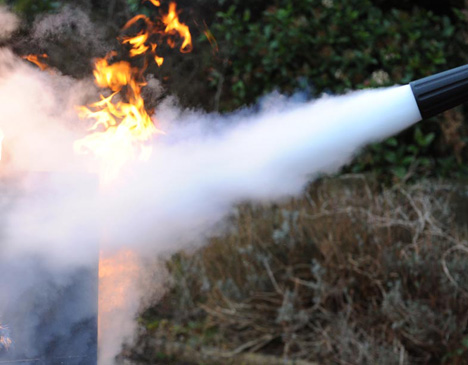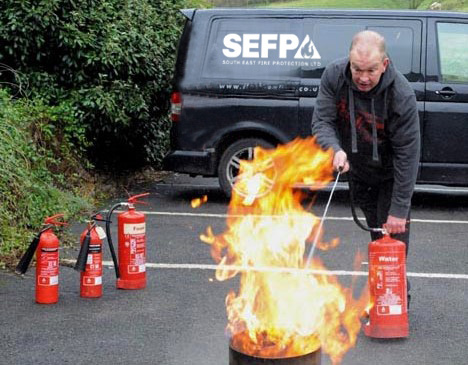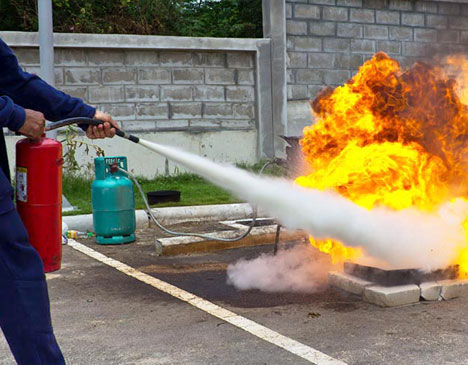Fire Safety Training
MANAGEMENT & EVACUATION



Article 21 of the Regulatory Reform (Fire Safety) Order 2005, requires the responsible person to ensure that employees and appointed fire marshals/wardens are provided with adequate fire safety training. This should be repeated periodically, or be provided in a manner appropriate to the risk identified by the fire risk assessment.
South East Fire Protection LTD provide a range of courses to enable you to meet these obligations, training carried out at your site, or E- learning options.
- Introduction: Importance of Fire Safety in the Workplace
- Fire Safety Video
- Use of Extinguishers on a Live Fire (Participative Demonstration)
(2 Hours – Maximum 15 Persons)
- Introduction: Course Aims and Objectives
- Why the Need for Fire Training?
- Regulatory Reform (Fire Safety) Order 2005
- Video – Case Study
- Group Exercise – Related to your Business
- Fire Prevention and Good Housekeeping Practices
- Nature and Development of Fire
- The Fire Triangle, Methods of Fire Spread
- Video – Extinguishing Fires at Work
- Use of Extinguishers on a Live Fire (Participative Demonstration)
- Home Fire Safety
- Course Review
- Certificate issued on successful completion
- Booklet Fire Safety
- Introduction: Course Aims and Objectives
- Why the Need for Fire Training?
- Video – Case Study
- Group Exercise – Related to your Business
- Examining the Role of the Fire Warden
- Fire Prevention and Good Housekeeping Practices
- Evacuation Procedures (Human Behaviour, children, adults, special needs)
- Nature and Development of Fire
- The Fire Triangle, Methods of Fire Spread
- Video – Extinguishing Fires at Work
- Use of Extinguishers on a Live Fire (Participative Demonstration)
- Course Review
- Certificate issued on successful completion
- Booklet Fire Safety
- Complete this online course in just 30 minutes
- Helps you meet requirements of The Fire Safety Order 2005 and The Health and Safety at Work Act 1974
- Identify hazards, reduce risk and improve safety
- IOSH and CPD approved training
- End of training test and printable certificate
The Nature of Fire: To begin, we cover the nature of fire – how it works, and the different ways in which it can spread; we also cover smoke and the dangers it poses. This introduction is important for Fire Wardens, so they learn what behaviour to expect from fire and smoke and how important it is to help educate their colleagues too. It’s the starting point in the process of keeping the workplace safe.
Signage: Health and safety signs can save lives – they are used to communicate important messages to prevent injury or give instructions in an emergency. This section identifies the different types of signs you may see in the workplace; we define what they look like, what they mean, and our Traffic Light System provides a simple way to remember the different types.
Hazards: In this section, we discuss the potential fire hazards that can arise in the workplace – covering ignition sources, flammables and combustibles. We also discuss certain working practices that need to be implemented to avoid creating fire hazards.
Emergency Procedures: This section explains what action to take in the event of an emergency. This step-by-step process includes raising the alarm, calling emergency services, and an evacuation procedure. We also explain what you should do if you’re unable to escape in an emergency, including a demonstration of the “Stop, Drop & Roll” technique.
Portable Fire Extinguishers: To conclude our programme, this section teaches users about when it’s safe to fight a fire, and when it’s NOT. We provide demonstrations on how to use the five common types of fire extinguisher, as well as fire blankets. Users learn about the different “Classes of Fire”, and which extinguisher to use on each class.
- This course has RoSPA, IOSH & CPD approvals
- Helps you meet requirements of the Fire Safety Order 2005 and the Health and Safety at Work Act 1974
- Complete in just 40 minutes
- End of course test and printable certificate
- Easy to follow and navigate through

